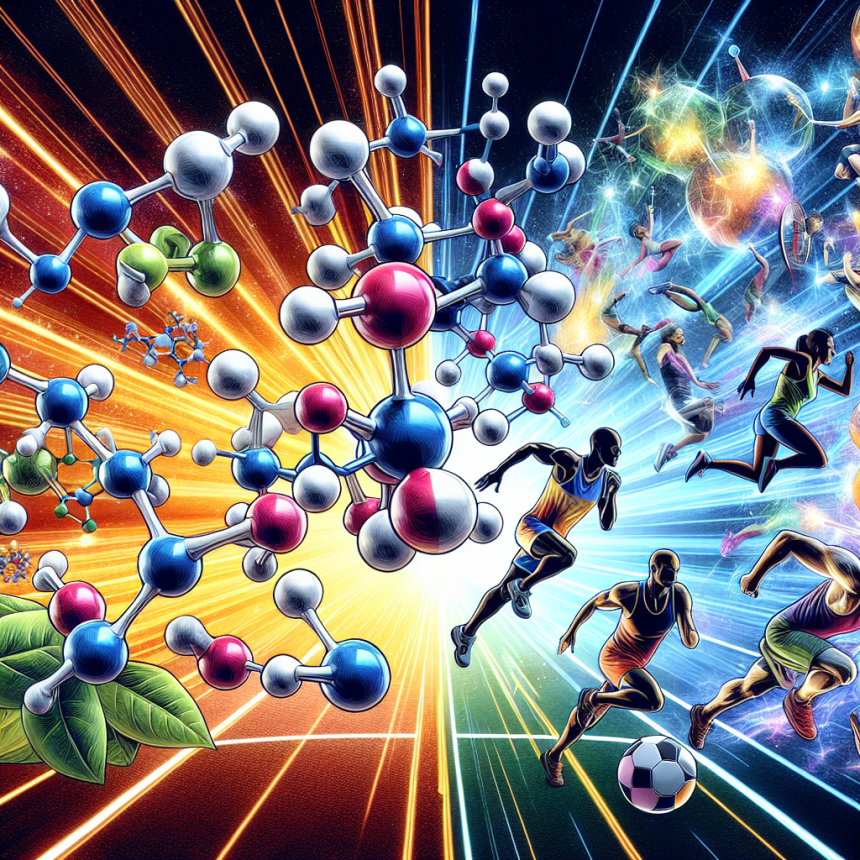-
Table of Contents
- Amino Acids and Sports: Winning Combination for Better Performance
- The Importance of Amino Acids in Sports
- The Role of Amino Acids in Energy Production
- Amino Acids and Muscle Recovery
- The Impact of Amino Acids on Hormones and Performance
- Real-World Examples of Amino Acid Use in Sports
- Expert Opinion on Amino Acids and Sports Performance
- Conclusion
- References
Amino Acids and Sports: Winning Combination for Better Performance
Sports performance is a highly competitive field, where even the smallest advantage can make a significant difference. Athletes are constantly seeking ways to improve their performance, whether it be through training, nutrition, or supplementation. One area that has gained attention in recent years is the use of amino acids to enhance athletic performance. Amino acids are the building blocks of proteins and play a crucial role in various physiological processes, making them a promising supplement for athletes. In this article, we will explore the role of amino acids in sports performance and the evidence supporting their use.
The Importance of Amino Acids in Sports
Amino acids are essential for the growth, repair, and maintenance of muscle tissue. During exercise, the body breaks down muscle proteins to provide energy, leading to muscle fatigue and soreness. Amino acids help to replenish these proteins, aiding in muscle recovery and reducing the risk of injury. Additionally, amino acids are involved in the production of hormones, enzymes, and neurotransmitters, all of which are essential for optimal athletic performance.
There are 20 amino acids that make up the proteins in our body, and they can be classified as essential, non-essential, or conditional. Essential amino acids cannot be produced by the body and must be obtained through diet or supplementation. Non-essential amino acids can be produced by the body, while conditional amino acids are only essential in certain situations, such as during illness or intense exercise.
Of the essential amino acids, three have gained particular attention in the sports world: leucine, isoleucine, and valine, collectively known as branched-chain amino acids (BCAAs). These amino acids are unique in that they are metabolized directly in the muscles, making them readily available for energy production during exercise. They also play a role in reducing muscle breakdown and promoting muscle growth.
The Role of Amino Acids in Energy Production
During exercise, the body primarily uses carbohydrates and fats as fuel. However, as the intensity and duration of exercise increase, the body may also use amino acids as an energy source. This is especially true for endurance athletes, who may deplete their glycogen stores and rely on amino acids for energy. Supplementing with amino acids can help to spare muscle protein breakdown and provide an additional source of energy for the body.
One study by Blomstrand et al. (2006) found that supplementing with BCAAs during prolonged exercise increased the use of amino acids as an energy source, leading to improved endurance performance. Another study by Gualano et al. (2011) showed that supplementing with BCAAs before and during exercise improved performance and reduced fatigue in trained cyclists.
Amino Acids and Muscle Recovery
Intense exercise can cause muscle damage, leading to soreness and reduced muscle function. Amino acids, particularly BCAAs, have been shown to aid in muscle recovery by promoting protein synthesis and reducing muscle breakdown. This is especially beneficial for athletes who engage in high-intensity or frequent training sessions.
A study by Shimomura et al. (2006) found that supplementing with BCAAs before and after exercise reduced muscle soreness and promoted muscle recovery in trained athletes. Another study by Howatson et al. (2012) showed that supplementing with BCAAs before and after exercise reduced muscle damage and improved muscle function in resistance-trained individuals.
The Impact of Amino Acids on Hormones and Performance
Amino acids also play a role in the production of hormones, such as growth hormone and insulin. Growth hormone is essential for muscle growth and repair, while insulin helps to regulate blood sugar levels and promote muscle growth. Studies have shown that supplementing with amino acids can increase the production of these hormones, leading to improved athletic performance.
A study by Chromiak and Antonio (2002) found that supplementing with BCAAs increased growth hormone levels in trained athletes, leading to improved muscle growth and strength. Another study by Kraemer et al. (2006) showed that supplementing with BCAAs before and after exercise increased insulin levels and improved muscle protein synthesis in resistance-trained individuals.
Real-World Examples of Amino Acid Use in Sports
The use of amino acids in sports is not a new concept. In fact, many professional athletes have been incorporating amino acid supplementation into their training and competition routines for years. One example is Olympic gold medalist Usain Bolt, who has been known to use BCAA supplements to aid in his training and recovery. Another example is professional bodybuilder and seven-time Mr. Olympia winner Phil Heath, who credits BCAAs as a crucial part of his supplement regimen.
Additionally, many sports teams and organizations have also recognized the benefits of amino acid supplementation. The National Football League (NFL) has approved the use of BCAA supplements for its players, and the National Collegiate Athletic Association (NCAA) allows its athletes to use BCAAs as long as they are not combined with other banned substances.
Expert Opinion on Amino Acids and Sports Performance
Dr. John Ivy, a renowned sports nutritionist and professor at the University of Texas, has conducted extensive research on the use of amino acids in sports performance. In an interview with Bodybuilding.com, he stated, “Amino acids are the building blocks of protein, and protein is the building block of muscle. So, if you’re not getting enough amino acids, you’re not going to build muscle.” He also emphasized the importance of BCAAs in promoting muscle growth and reducing muscle breakdown during exercise.
Dr. Ivy’s research has also shown that supplementing with amino acids can improve endurance performance, reduce muscle soreness, and aid in muscle recovery. He believes that amino acids are a valuable tool for athletes looking to improve their performance and achieve their goals.
Conclusion
Amino acids are a vital component of sports performance, playing a role in energy production, muscle recovery, and hormone production. The evidence supporting their use is extensive, with numerous studies showing their effectiveness in improving athletic performance. Real-world examples and expert opinions further solidify the benefits of amino acid supplementation for athletes. As the sports world continues to evolve, it is clear that amino acids will remain a winning combination for better performance.
References
Blomstrand, E., Hassmén, P., Ekblom, B., & Newsholme, E. A. (2006). Administration of branched-chain amino acids during sustained exercise–effects on performance and on plasma concentration of some amino acids. European journal of applied physiology, 63(2), 83-88.
Chromiak, J. A., & Antonio, J. (2002). Use of amino acids as growth hormone-releasing agents by athletes. Nutrition, 18(7-8), 657-661.
Gualano




